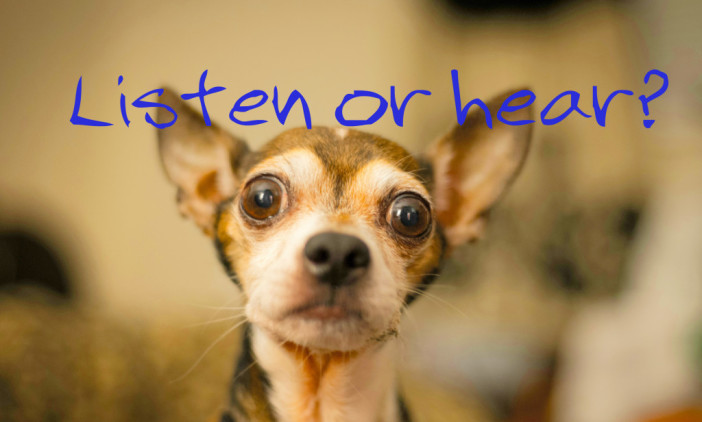Listen or hear?
The verbs to listen and to hear can also be confusing to English learners. Much like to look and to see, these words focus on one of our physical senses. To listen and to hear both concern what we do with our ears.
Let me give an example. Today my husband was reading an article in the newspaper. I was trying to tell him about my plans for Easter. I asked him if he had heard me, and he nodded his head. I said:
I know you can hear me, but are you listening to me?
To hear involves your ears, just as to look involves your eyes. It has a physical meaning. Sit quietly. What do you hear? I hear my fingers on the keyboard. I hear my computer humming. I hear some men working outside. I hear my dog breathing loudly. I hear the clock ticking. I hear a car driving down the street.
But I’m not listening to these sounds. My mind is on something else. I’m thinking about what I’m writing. My ears are hearing things, but I’m not paying attention to them. We hear sounds around us all the time, but we don’t really notice them.
To listen means using your ears, but also paying attention to what you hear. For example, when I walk, I listen to music. When I have lunch with a friend, I listen to what she says. When I wake up early, I listen to the birds outside. When we listen, we not only hear but we also pay attention.
Some common English expressions using these verbs are:
Listen to this! (When you want someone to listen to you, especially when you read something out loud)
Please listen to reason! (When the person you are talking to is thinking of doing something unwise)
I hear you! (I understand and agree with what you just said)
Hear me out! (Listen to what I say before you give me your opinion)
Have you heard from ….? (Has this person contacted you?)
Hard of hearing (Someone can’t hear well; they are somewhat deaf)
Finally, note that when you have a direct object (a person or thing), to hear is not followed by a preposition. You hear something. I hear him talking. I hear music. I don’t hear any birds. However, when there is a direct object, to listen is always followed by a preposition, usually to. You listen to someone or something. I am listening to him. I am listening to music. I’m not listening to you, because I’m mad at you. If you listen for something, it means you expect to hear something. I am listening for the doorbell, because my friend is going to come any minute.
To practice these words, make two short lists. First, right now, what do you hear? Second, what do you enjoy listening to?




